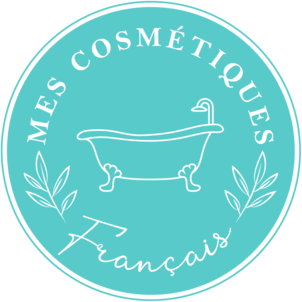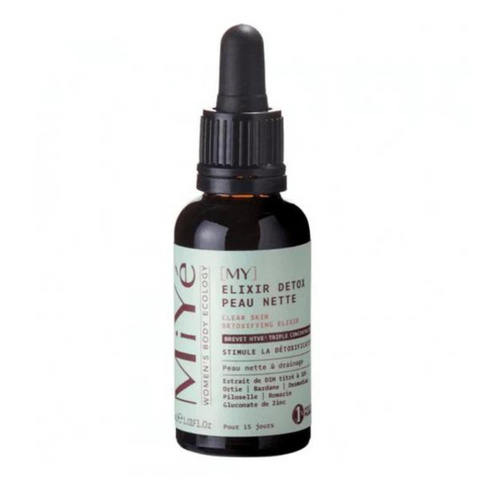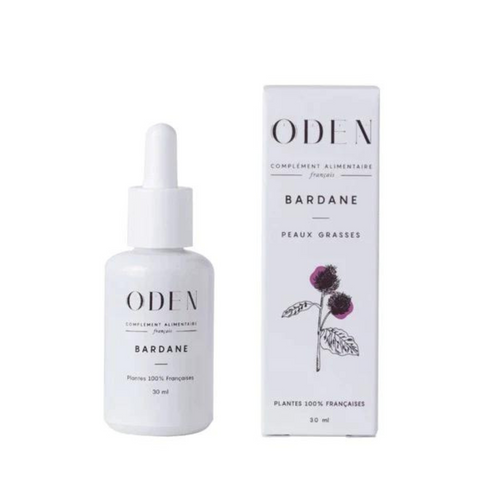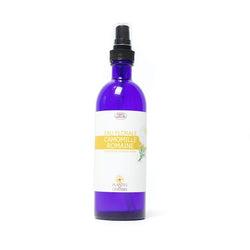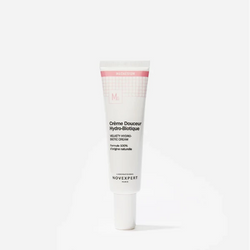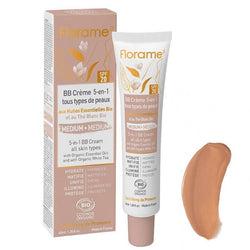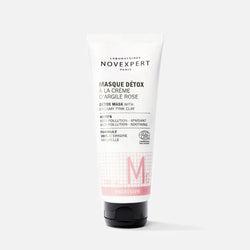The most common form of eczema East atopic dermatitis, also known as atopic eczema.
All like psoriasis, it's a disease inflammatory skin chronic, non-contagious, usually genetic, responsible for itching and evolving by thrust.
Dermatologists, pediatricians, allergists and general practitioners are trained to diagnose and sometimes treat these skin conditions.
Here we give you advice to understand and mitigate its effects which can be experienced as a daily ordeal.
We will get to it :
- How does eczema and psoriasis manifest?
- How to recognize eczema and psoriasis?
- What are the factors that can make eczema and psoriasis worse?
- Which Herbs to Relieve Eczema and Psoriasis?
- What complementary remedies for eczema and psoriasis?
- How to soothe the itch associated with eczema and psoriasis?
- What natural dermo-cosmetic treatments to treat atopic skin?
1. How does eczema and psoriasis manifest?
- atopic eczema
Atopic eczema abates sharply in childhood when the immune system becomes mature with lesions more localized in the folds, elbows, neck, wrists, backs of the knees. Disappearance in 80% of cases by adolescence at the latest.
In adults, eczema will also generally be located in the folds but can also appear in the neck, hands, ankles, feet.
1 in 4 children and 1 in 10 adults are affected by eczema.
There is another type of eczema.
It is a local allergic reaction triggered by repeated skin contact with a sensitizing substance (pollen, dust mites, animal hair, nickel, etc.) called an allergen. It is more for adults.
Atopic eczema and contact eczema can be associated in the same person.
Is characterized by red patches covered with scales mainly present on the knees, scalp, elbows, legs, palms of the hands and soles of the feet.
The psoriasis is the consequence of a accelerated cell renewal of the epidermis (in 3 or 4 days instead of the normal cycle between 28 and 30 days).
Naturally the dead cells desquamate, are eliminated and give way to new cells. In the case of psoriasis, the new cells accumulate then on the surface of the skin, increasing the thickness of the stratum corneum, located on the surface of the epidermis, and explaining the production of scales. An inflammatory reaction is created often maintained by scratching or rubbing.
The disease most often manifests between the ages of 20 and 40, although it also occurs in young children.
These 2 diseases can be linked to a psychological and emotional experience.
2. How to recognize eczema and psoriasis?
|
Eczema |
Psoriasis |
|
Dry and rough skin Red lesions Small blisters filled with oozing clear fluid Apparent crusts after the oozing phase A strong itch |
Thick plates Redness Desquamation * Itches |
* Small lamella that detaches from the superficial layers of the epidermis
- Psoriasis
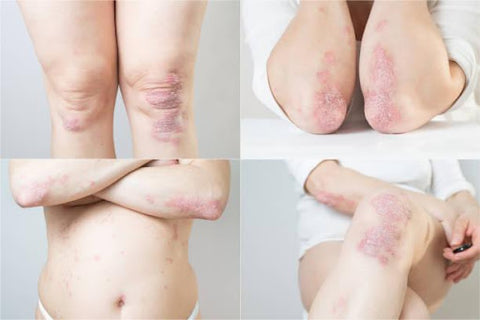
- Eczema:
- Client at Biotanie:
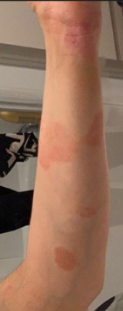
- Customer at Naturaloé:

3. What are the factors that can make eczema and psoriasis worse?
The skin is both the filter, the envelope of the body, the mirror of the organism and that of the soul. Several causes can be at the origin of skin diseases.
In case of purulent eczema or bacterial superinfection such as impetigo, medical treatment with cortisone is prescribed. They will calm the symptoms but rarely prevent new flare-ups.
For a lasting action, it is necessary to know appease as best as possible the inflammatory state and regulate immune system.
Food or ENT allergies, rhinitis, asthma can appear simultaneously with atopic dermatitis.
To limit the development of the disease, temporarily remove certain allergens.
|
FOODS TO AVOID |
PRIVILEGE FOODS |
|
Cow milk Egg white Café Consumption of saturated fats (limit red meats, deli meats, prepared meals and ultra-processed products, fried foods) Certain legumes (peas, soybeans) Certain oilseeds (peanut, hazelnut) The consumption of fast sugars (white flour, prepared meals, honey, soda and fruit juices, etc.) |
Salsify, asparagus Vit A : Carrot, pumpkin Vit C : Guava, kiwi, blackcurrant, cherry, lemon, orange, mango, broccoli, spinach Turmeric, basil, garlic, onion, rosemary, pine nuts Omega 3 : nuts, rapeseed oil, oily fish (herring, mackerel, sardines, salmon) Flavonoids : Green tea, grape, onion, apple, blackcurrant, blueberry Year E ; wheat germ, avocado Semi-complete or complete flour Foods with anti-inflammatory properties (matcha tea, turmeric, black pepper, ginger, blueberries, artichokes, dark chocolate…) |
This list is not exhaustive and depends on the intensity of your eczema or psoriasis.
Sometimes psoriasis is a manifestation of a wheat intolerance.
If implementing an "anti-inflammatory" diet isn't enough, you can try a gluten-free diet and see how your health changes over time.
These diseases can be strongly linked to stress. If this is your case, many solutions exist: relaxation, sophrology, meditation, which will promote relaxation.
Stress can be due to anxiety, but can also be of affective or emotional origin (breakup, bereavement, dismissal, etc.). In this case, psychotherapeutic support can help you regain some form of serenity.
Tobacco and alcohol aggravate symptoms and shorten the time between flare-ups.
The injection of a vaccine, certain infectious diseases such as bacterial angina, certain drugs such as lithium, antimalarials, interferon and beta-blockers can trigger flare-ups of psoriasis.
Animal hair, dust mites, molds, pollens, cigarette smoke are the most well-known environmental allergens and probably linked to eczema.
As atopic skin is very reactive, other factors may be involved in the appearance of eczema: detergent and fabric softener, household products, dyes in clothes, poor quality cosmetics...
The route of penetration of allergenic factors is not only through the skin but also through the digestive tract.
|
A few daily rules excerpt from the book: I take care of my skin naturally
|
4. Which herbs to relieve eczema and psoriasis?
- The Lawyer : Action nourishing and regenerating the skin in depth.
- Shea Butter : contains tocopherols (vitamin E) and antioxidant triglycerides. It hydrates, soothes and strengthens the lipid barrier of the cornea.
- Calendula : highly hydrating, it helps maintain the water content in the epidermis. Anti-inflammatory, it soothes the skin and calms irritations of atopic skin. Antioxidant, it limits cellular degradation and helps to regeneration of damaged skin tissue.
- Hemp : helps the skin to regenerate and promotes healing.
- Aloe vera, traditionally used to soothe sunburns, minor burns, soothe irritations and promote healing, this succulent plant is also the best friend of fragile skin. The aloe vera maintains skin hydration thanks to its concentration of polysaccharides which form a water-retaining barrier. It accelerates cell regeneration, especially of fibroblast cells that make collagen. The aloe vera promotes the elimination of dead cells thanks to the proteolytic enzymes it contains and has a strong astringent power (tensor effect) due to its phenolic components (tannins).
Other assets from Green Chemistry:
- silver powder contributes to the care of inflamed and irritated skin. Powerful anti-inflammatory, it helps to restore the optimal physiological balance of the cutaneous microflora. Used regularly, it strengthens skin resistance, inflammatory phenomena are therefore reduced and controlled.
5. What complementary remedies for eczema and psoriasis?
It may be useful to supplement our diet with probiotics. Probiotics are micro-organisms (or bacteria) also called lactic ferments because they produce lactic acid. They are found naturally in the intestinal flora where they help regulate transit.
We know that contact eczema occurs when an allergen comes into contact with the allergic subject.
This dermatitis of allergic origin is partly linked to immaturity of the digestive immune system in infants or a malfunction of this same system, in adults.
The foods we eat contain allergens. This dysfunction of the digestive system will decrease tolerance and therefore potentially induce allergic reactions.
The preventive action of strains of Lactobacillus rhamnosus optimizes tolerance to the problem of food allergy.
Numerous studies have revealed the effectiveness of this probiotic.
Its properties are diverse:
- Soothes chronic inflammation of the skin, linked to allergies and au psoriasis,
- Effective in atopic dermatitis; inhibits the proliferation of Staphylococcus aureus,
- Reduces mild to moderate acne lesions,
- Reduces injuries related to eczema
Vitamin D has a major role in the proper functioning of the immune system and to calm autoimmune reactions. To maintain a good blood level of the vitamin all year round, sunbathe in the summer (protecting your skin) and daily supplementation the rest of the year in the form of daily drops of Vitamines D3.
These skin diseases can sometimes be linked to a imbalance of liver functions.
In this case, a drainage of the liver will bring a marked improvement in the dermatitis.
A 10-day plant cure like the black radish, desmodium (if fragile liver or sensitivity) or the fumeterre (regulates the purifying functions of the gallbladder and the liver) helps to purify, support the activity of the liver and facilitate its decongestion.
In herbal tea for example, burdock And the wild thought have properties anti-inflammatories which will help relieve symptoms.
Complete your routine with our "in" treatments
L'Miyé Clear Skin Detox Elixir stimulates detoxification and body drainage to promote clear, glowing skin. A concentrate of 5 plants (burdock, nettle, pilosella, desmodium, rosemary) and zinc gluconate to be taken daily in the 15 days preceding the period, after excesses or during seasonal changes.
The burdock herbal medicine is a dietary supplement renowned for improve skin quality from within thanks to its purifying properties. Rich in inulin, a natural prebiotic, burdock root will regulate the imbalances of the intestinal microbiota often at the origin of skin problems.
It is recommended for:
- Boost the body and do a detox cure
- Skin disorders: acne, eczema and psoriasis
- Regulate excess sebum
To be taken morning and evening, as a cure for at least 30 days.
In summary, to best treat these diseases, several measures must be taken.
- Adapt your diet.
- Restore the balance of the intestinal microbiota to preserve the effectiveness of the immune defences,
-
Rebalance liver functions if necessary
6. How to soothe the itch associated with eczema and psoriasis?
Pruritus or "itching" usually occurs during flare-ups.
Dry skin can lead to the irresistible urge to scratch, an infernal circle to be avoided so as not to aggravate atopic dermatitis by causing inflammation and stronger itching.
Trick :
- Cut your fingernails short
- If you are breastfeeding, breast milk remains the best moisturizer for inflamed skin by applying a few drops to sensitive areas several times a day until improvement.
- A seawater bath, (except during flare-ups) rinse directly afterwards to remove the salt and prevent the skin from drying out
- An oatmeal bath (but not too hot) will soothe irritation
- Textiles made from silver thread are very effective, they allow the elimination of bacteria, fungi and mycosis, relieve irritated skin and stop itching
- Moisturize the skin well to strengthen the hydrolipidic film and restore the skin's barrier function
|
Recipe Green clay poultice from the book: I take care of my skin naturally In a glass or ceramic bowl, successively pour:
Mix until you get a smooth and thick paste. Apply this paste in a thick layer on the area to be treated. Wrap the clay with a damp bandage. Leave on for at least 30 minutes before rinsing and drying. This poultice will cleanse the skin and promote faster circulation. Suitable from 12 years and for weeping eczema. |
7. Which natural dermo-cosmetic treatments to treat atopic skin?
Anything that can dry the skin more, such as long daily hot showers, soap, scrubs and toners, should be avoided.
Attention cosmetic products containing fruit acids (salicylic and glycolic acids) not recommended for sensitive skin, as they modify the quality of the microbiome. Adopt moisturizing, non-comedogenic skincare products with a pH similar to that of the skin, which is naturally acidic (pH 5). This is the case, for example, of products based on thermal water.
The sensitivity of atopic skin requires the use of mild detergents, if possible without soap, perfume or lanolin, a hyper allergen from sheep wool fat.
In times of crisis, avoid applying cosmetic products to the lesions.
Instead, opt for a few drops of vegetable oil of borage, evening primrose, calendula or argan to relieve yourself.
The essential steps of your daily routine
1. MORNING ROUTINE
Step 1 - Gently rebalance the PH using hydrosols or floral waters Organic Witch Hazel or Roman Chamomile. To be applied to the skin using a cotton ball or directly as a spray.
Step 2 – Soothe Help heal the skin and soothe irritation and itching with the Dermoplant CicArgent Serum.
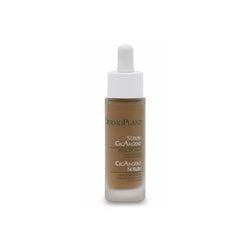
Step 2 – Hydrate the skin with the Soft cream from Novexpert, ideal for sensitive skin lacking comfort.
As an alternative to the Hydro-Biotic Gentle Cream , we also recommend the Biotanie Hydrapaise face cream.
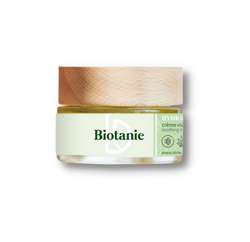
Step 4 - Make up
The BB Cream 5-in-1 - With essential oils and organic white tea from Florame is the subtle alliance between care and make-up. To increase coverage, apply the cream a second time.
2. EVENING ROUTINE
Step 1 - Remove makeup with a facial cleansing oil - Les Essentiels soap factory, composed only of mild, non-allergenic vegetable oils, such as organic jojoba vegetable oil, apricot kernel vegetable oil and Camellia vegetable oil.
Step 2 - Clean to gently remove impurities, excess sebum and make-up residue, purify and deeply cleanse the epidermis, with micellar cleansing foam - Florame
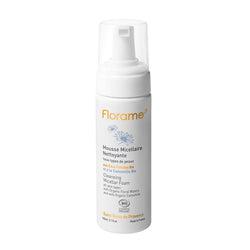
Step 3 - Soothe Help heal the skin and soothe irritation and itching with the CicArgent Serum by Dermoplant.
Step 4 – Feed Absolute Neutral Care-Balm - Face and Body | Sensitive skin - Oppidum offers silky protection to sensitized and reactive skin. It combines the delicacy of white lily, the silky touch of cottonseed oil, the balance of evening primrose and the regulating properties of jojoba with the strong nourishing power of shea and coconut.
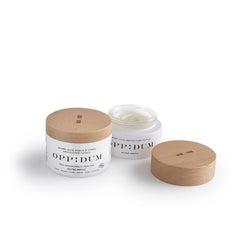
Step 5 – Protect. In local application, the CicArgent Cream – For Atopic Skin by DermoPlant promotes healing of the skin, both on the surface and in depth. With a light and pleasant texture and emollient properties, it calms irritated and itchy skin, while protecting it.
Alternatively, we suggest the Réjence Daily Cream Gel. This face and body cream is a concentrate of organic aloe vera juice and prebiotics to nourish, protect and repair sensitive skin. Ideal for the whole family !
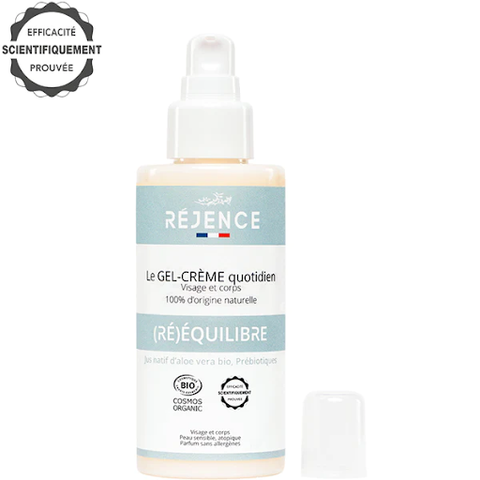
3. ADDITIONAL CARE
To be done fortnightly
- Scrub
Aloe vera is a good emollient helping to promote the healing of eczema patches. THE Celeste gentle scrub - Sensitive skin - DermoPlant - 50 mL provides extra care for your skin by gently removing dead cells and superficial impurities without affecting the thin protective layer of the skin.
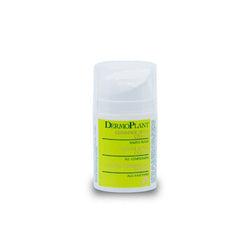
- Masque
The Detox Mask from Novexpert acts as an oxygenation cure for a fresh and rested complexion in a few minutes.
Adapt the DETOX diet to your skin by leaving on: 15 min for oily, combination or normal skin. 10 min for dry skin. Rinse with lukewarm water then finish with cold water.
Find all our products to naturally relieve eczema here and psoriasis about here.
beauty diagnosis?
